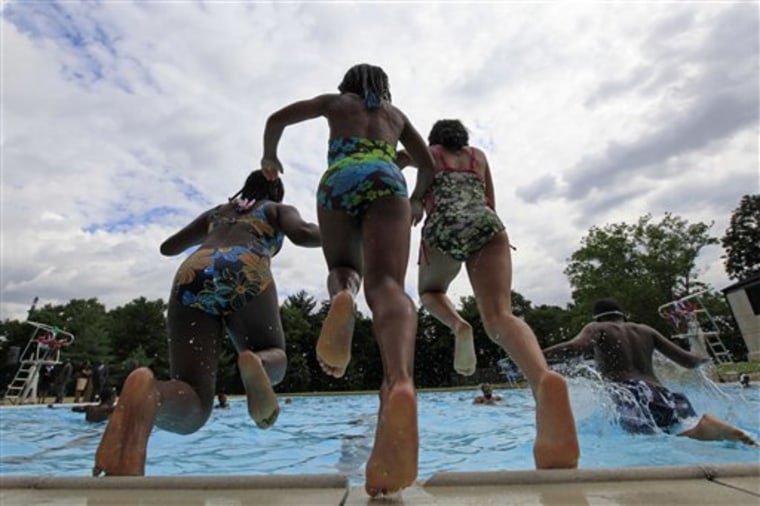Lined up outside the gates of the city's swimming pool, the children of Alexandria, Ind., began chanting "We saved the pool!"
Then they stood shoulder-to-shoulder on a cool June day with hardy adults and jumped in the water together.
Their summer had been saved.
Families and business owners all over are collecting money to keep open pools that their cities can't afford.
A citywide campaign in Philadelphia has netted $620,000, keeping more than half of the pools open. A church in Toledo donated $5,000 for an inner city water playground.
"We've come from a couple of generations where we assume that everything is going to come to us," said Vanessa Hosier, who led efforts to save the pool in Alexandria, a town of about 6,000 people. "We wanted our kids to believe that they could do this."
Sold cookies, collected change
Youngsters sold cookies and stuffed piggy banks — one had 16 cents and a note inside that said, "Thank you for saving our pool." Their wave of resiliency inspired business owners and older folks to donate, too, bringing in just over $40,000 to replace a leaking pool liner.
"The park wouldn't have been whole again without the pool," Hosier said. "It's an icon for this town."
Collecting money for public pools might seem unusual at a time when cities are facing huge deficits and laying off police officers and slashing funding for programs that feed the poor. But pools provide more than just relief from summer's heat.
For many towns, they're a gathering spot, a nostalgic leftover of carefree days. For kids in big cities, they're a safe place to have fun and take swim classes.
"You can't learn to swim under a garden hose," said Louis Bradley Hooks, who hopes to raise $187,000 to refurbish and reopen a pool in Johnsonville, S.C., which has 1,400 residents.
"That's where I learned to swim and so did many people in the community," he said. "That pool has touched a lot of lives."
With so many people unemployed now, public pools are needed even more, said Tony Liberatore, parks director in Cranston, R.I., where private donors are keeping the pool open through most of August.
"It just gives people some place to go that's close and get their minds off their problems," he said. "They're out of work. They can't afford the parking fees when you go to a beach."
Not just pools being affected
It's not just pools that have been saved by public donations this year. Three businesses in Carnation, Wash., collected $1,100 to keep open a city park. In Greenfield, a small town in southern Ohio, volunteers gathered donations this spring to save youth baseball.
Most community fundraising campaigns, though, have gone toward public pools, which are easy targets during tight budget times because they're expensive to maintain and open for just a few months in northern cities.
Philadelphia was set to close all but 10 of its 73 pools before asking for help. It now has 46 pools open. Most of the money has come from businesses; a pharmaceutical company gave $100,000.
An anonymous $12,000 gift combined with smaller donations are keeping all four pools operating in Attleboro, Mass. Some donations included letters from people who swam at the pools when they were young, said Dennis Walsh, the city's recreation director.
Organizations that help low-income residents in Toledo banded together to open five pools when city leaders said they couldn't justify the costs after laying off 75 police officers.
"Learning to swim is a skill that should be learned by every child," said Eric Slack, director of planning for the Economic Opportunity Planning Association of Greater Toledo.
Black children more likely to drown
According to a study released last year by USA Swimming, the national governing body for swimming, black children are much more likely to drown than white children because far fewer know how to swim.
Eight-year-old Makaila Stelovich of Toledo said she couldn't imagine summer without the pool across the street from her home. "We don't do much in the summer except swim," she said.
The problem cities face, especially now, is that pools are expensive to operate.
It costs Grand Rapids, Mich., about $750,000 to operate six public pools. That's $10.75 for every swimmer who uses the pool, said Jay Steffen, the city's parks director.
Two years ago, a couple of business owners started a fundraising campaign to keep the city's pools open and give children free admission. Donations have dropped this year, forcing a $1 charge for kids.
"What I worry about is the sustainability of operating these facilities by donations," Stefan said. "At some point, these donors might say 'The buck stops here.'"
